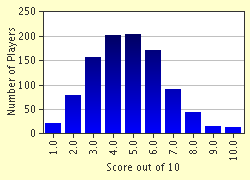Quiz Answer Key and Fun Facts
1. Which of these is NOT a scale for measuring earthquakes?
2. What is the name for a minor quake that occurs before the main earthquake?
3. What do the letters USGS stand for?
4. The word "seismic" means earthquake, and most discussions of earthquake activity are likely to include this term in some form. For example: Seismologist - scientist who studies earthquakes. From what language did this word originate?
5. When referring to earthquakes, what is a "fault"?
6. Approximately how deep is the San Andreas fault in California?
7. What does "Pangaea" refer to?
8. The word "Tsunami" comes from the Japanese words which mean?
9. Which U.S state is statistically most likely to be hit by a tsunami?
10. In which year did a major tsunami strike Papua New Guinea resulting in massive loss of life?
Source: Author
chari1
This quiz was reviewed by FunTrivia editor
crisw before going online.
Any errors found in FunTrivia content are routinely corrected through our feedback system.


